Lucy Roth's Blog
September 17, 2025
Girls to the Front
It’s funny how book ideas come to you. What comes first has changed with each book I’ve written. Sometimes it’s a title, sometimes it’s a hook, sometimes a societal issue and sometimes a character…
With my upcoming thriller, Girls to the Front, it was the title that came first. I was pondering book ideas, wanting to experiment by writing a thriller, but still being so keen to write another book steeped in the alternative music scene.
And then Bikini Kill’s gig policy popped into my head.
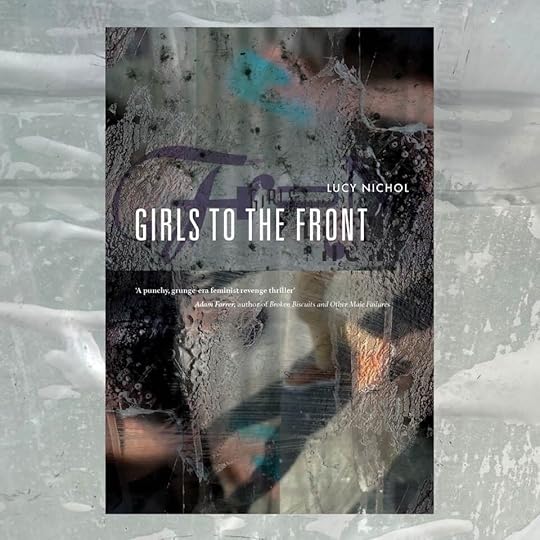
In the 90s, Kathleen Hanna invited all girls to the front because she knew many didn’t feel safe at gigs. Indeed, many weren’t safe at gigs. From being physically or sexually assaulted, to simply feeling threatened by the behaviour of the crowd, having a women-only space up front was a way to create more equality - a space where everyone could feel safe and enjoy the show.
This led me to think about women’s safety, misogyny and abuse more broadly within the music industry. I’d read about Courtney Love being attacked and molested when stage diving at her own gig. I’d watched the 2021 documentary Look Away about young girls being groomed and abused by older men in the music industry in the 70s and 80s. And of course, more recently, we’ve heard about the shady so-called White Parties held by P Diddy. And then there was the Marilyn Manson sexual abuse investigation. And, within entertainment more broadly, the investigation into Russell Brand. This is the tip of the ice-berg and, sadly, this issue isn’t going away. It seemed that there could be a story in writing about how blatant abuse can become lost in crowds at gigs (see also Woodstock 99), but how this can be overlooked because of a deeper, systemic misogyny. If the band plays on while a woman is being attacked, how might they behave with female fans behind closed doors? If a venue refuses to put in place safeguarding measures, how might they treat their female staff? It felt like there might be a way to talk about this using fiction and, more specifically, a found footage revenge thriller (the revenge thriller is always a little cathartic to write!)
While Bikini Kill encouraged all girls to the front in the 90s, it’s still an issue today. In fact, when I asked others on social media, I was told that the problems today were just as bad, but the threats were different. I had people telling me how their teenaged daughters were now afraid of needle spiking in crowds - something that hit the news in France recently and something that I never had to consider when I was young and, now, as a 47 year old woman (whose body temperature is highly dis-regulated), I tend to find my own little spaces around the edge to dance. But we should all be able to enjoy being at the centre of a crowd and enjoying the music together safely.
So with the title and hook in my mind, I knew I could write something that explored women’s safety and misogyny, while at the same time enjoying some fictional cathartic vengeance. It’s fiction - so why not.
And of course, this meant that I could write a book that was deeply rooted in music, and in the 90s (it’s a dual timeline story so takes you from the present day and back to 1995).
The story follows Roma, who works in a retro ents store and finds an old VHS tape and a note in a house clearance box. Meanwhile, in 1995, we meet mature student journalist Kat, who witnesses her friend being assaulted while stage diving at a gig and then discovers that there’s more to the band and the venue than what is being played out in public.
The book is now just one month away from publishing and pre-orders are now open! It makes a world of difference for readers to pre order - especially when you’re independently publishing like I am with this one. So if you fancy a read, please do stick a pre-order in. Details below. You’ll also get what I think is a work of art as a cover design - thanks to renowned 4AD designer Chris Bigg who worked with me on this project.
Hope you enjoy it!
AND, if you’re based in the North East, join me, music writer Molly Tie and Opt Indie for our launch event on 16th October at the Bridge Hotel.
Thanks for reading Larking with Words Subscribe for free to receive new posts and support my work.
August 17, 2025
Capitalising on the naked face
Pamela Anderson and Drew Barrymore’s naked faces are genuinely liberating. A movement to celebrate. A reminder that we don’t need to change who we are. And yet, in the wake of such liberation, we are bombarded by ads from beauty companies capitalising on this new approach to confidence and reminding us that, in order to achieve the acceptable naked look, we do in fact need to change who we naturally are:
Take this product to improve elasticity.
Use this device to reduce jowls.
Apply this product to even out red skin tones.
Sign up to these facial yoga exercises to stay young.
Every single time I go on Instagram or Facebook there’s another expensive product or routine that I apparently need. It’s no good being natural if you don’t stop the signs of aging. Our confidence is being built back up when we see naked faces, then torn back down when we see the latest beauty ad.
 Photo by Content Pixie on Unsplash
Photo by Content Pixie on UnsplashThis is supposed to be a liberating movement. We are supposed to be rejoicing in finally being allowed to be ourselves. Yet, in order to do that, we are told we need an increasingly expensive range of lotions, potions and pills - natural or otherwise - to maintain ourselves.
I’m not sitting here writing this saying I’m some kind of purist. I wear make-up and I fall for these ads. I’m a marketer’s dream. My mood doesn’t lift when I see these ads, it drops. Plummets. I feel like I’m not good enough. I watch these products being demonstrated wishing I could afford everything that’s pushed on to me as then, and only then, will I finally look acceptable enough to the naked eye.
Except there’s always going to be something else to work on, isn’t there?
And that’s precisely why I’m writing this. I’m not narcissistic enough to think I can change anything. I just needed to vent after seeing yet another ad this morning reminding me that, unless I use their ‘natural’ product, I’m not going to be pretty enough to be let loose on the world. I’m not going to be able to compete with the women who do use their products. Because the whole issue of the beauty industry telling us that we need to change in order to achieve peak beauty is still there. It’s just shape shifted slightly. We’re still being told to put stuff on our skin because our skin isn’t good enough. But now it’s an intervention rather than a cover up.
And it still costs an absolute fortune.
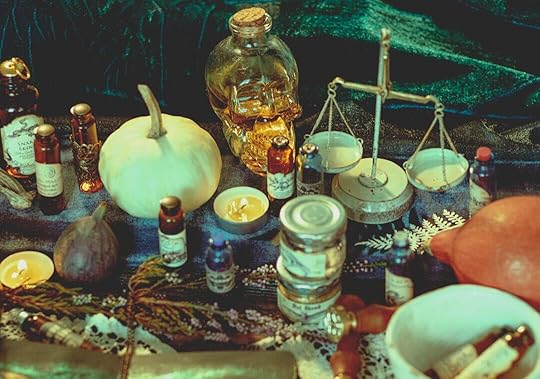 Photo by Elena Mozhvilo on Unsplash
Photo by Elena Mozhvilo on UnsplashI don’t think any of us are bad feminists for wearing make up or subscribing to this notion that our ageing skin needs to be reversed. We can’t single-handedly change what society thinks we should look like - and even collectively it will take something that is both radical and sustainable. After all, we’ve had it drilled unto us since we were kids, so we’re always going to want to keep up. We’re always going to be striving for better.
We are, however, definitely moving in the right direction celebrating the likes of Pamela Anderson and Drew Barrymore who have taken that first radical leap and appeared make-up free (and don’t try to tell me that’s not radical - in this day and age, it totally is.) But I do think we should consider whether all those collagens and neck massagers really are liberating. Or, rather, simply another way to keep us feeling ‘not enough’. I don’t blame the women behind the products or the influencers promoting them - they’re all caught up in it too. We are all caught up in this together - these unrealistic standards that are pushed on us. And that we all, inadvertently, push on each other.
So I think there’s a long way to go.
Money makes the world go around and unless that were to stop (which it won’t) we will always be in the clutches of the money-makers finding holes to exploit in our attempted liberation.
In the meantime, can someone please share tips and how to keep up with beauty standards by using stuff I already have in my food cupboard? A one-stop-shop inexpensive food product might be good. There simply isn’t enough money - or time - in the world to do everything Instagram is telling me to do right now. And surely, there are more important things going on.
Thanks for reading Larking with Words Subscribe for free to receive new posts and support my work.
May 2, 2025
When they talked about raging against the machine, I think they meant the power - not the people
What is going on? I mean, Hull. WHAT IS GOING ON? People seem to be voting against human rights in the name of….what, exactly? I’m no political expert - I’m rather basic in terms of my knowledge here, but I know enough to get angry.
The country is turning turquoise - in council terms - and the people are voting for it. So what does reform stand for? What ideals are they voting in?
Thanks for reading Larking with Words! Subscribe for free to receive new posts and support my work.
They’re voting for leaving the European Convention on Human Rights. They’re voting for scrapping open discussion around race and gender in schools. They’re voting to scrap equality, diversity and inclusivity policies. They’re voting for privatisation of the NHS. And they’re voting against immigration.
I mean, we all know there’s work to be done around immigration. Sensible policies that don’t demonise the wrong people. So when I see the leaders of Reform - and their high profile supporters - taking aim at the people on small boats - and having absolutely nothing to say about the powers that caused them to flee in the first place - you kind of have to acknowledge the real aims here. Because these are monied people. Monied people recruiting politically inexperienced puppets as mouthpieces to speak for the people* (*the rich people).
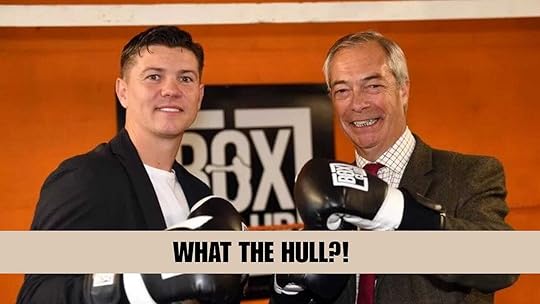
It’s as though the theatrics of boxing, wearing a flat cap and downing a pint of bitter are far more powerful than the actual truth - the fact that privately-educated Farage, for example, earns millions. Just because he goes down the pub and necks a pint doesn’t mean he’s ‘one of us’.
So if you really do want to rage against the machine…
If you really do believe in women’s rights, speak out about the real violence against women - not the imagined threat.
If you really do want to put a stop to immigration, get angry at the powers causing the terror and poverty in the first place.
If you really do think all lives matter, throw a life jacket to the ones drowning first.
God, it’s all seriously terrifying.
Thanks for reading Larking with Words! Subscribe for free to receive new posts and support my work.
May 1, 2025
When it's not just the baby blues
I haven’t given birth, so you might think this is a strange topic for me to write about. I have, however, been working with the fabulous and invaluable national charity, Action on Postpartum Psychosis (APP), for about four years now. And one thing I’ve learned is that maternal mental health is everybody’s business.
That’s why, in the run up to maternal mental health awareness week I thought I’d use my platform to add another voice to the campaign - to make sure that as many people as possible are aware of the signs of postpartum psychosis - a severe but highly treatable maternal mental illness.
Thanks for reading Larking with Words. Subscribe for free to receive new posts and support my work.
 Photo by Jonathan Borba on Unsplash
Photo by Jonathan Borba on UnsplashIt’s not just the baby blues
Before I talk about APP and postpartum psychosis (PP) specifically, there’s one thing that’s really struck me during the time I’ve been interviewing the many women who have experienced PP (it affects around 1,200 women each year in the UK. Of course I haven’t interviewed them all!) The thing that’s really stood out to me is how many have been told that their concerns, thoughts and behaviours were simply a sign of the ‘baby blues’.
I think this is a really important point, because not only is a missed or delayed diagnosis of PP incredibly dangerous (we’ve seen too many suicides linked to PP), but it also, in my mind anyway, indicates how women are far too often given catch all labels to explain away the many difficult health challenges they face.
And once lumped with that label - they’re expected to just crack on!
Period pain’s normal.
Mood swings are normal.
Feeling like it’s the end of the world is…normal.
But everything’s on a spectrum. Crippling period pain could be endometriosis. Mood swings could be postnatal depression or postpartum psychosis. Feeling like it’s the end of the world could indicate suicidal ideation.
Surely, by now, women should be trusted to know when something’s not normal. I mean, women are hardly weak and feeble little creatures. Women give birth, bleed profusely each month and undergo major hormonal shifts that affect every part of their body. So when a woman expresses a deep concern about her mental health - especially after giving birth - surely she should be listened to. And surely those concerns should be taken seriously.
I’m not suggesting that the baby blues couldn’t be upsetting enough to deal with. Every day life can feel overwhelming - and I imagine that giving birth must be incredibly overwhelming (I’m in awe of every woman who does it). And maybe, in those instances where it could be considered normal, being heard and supported might just be enough.
But if a woman is deeply concerned about her wellbeing, and/or if her partner is voicing concerns too, then maybe there’s more going on. And, more worryingly, when it comes to PP, the person experiencing it doesn’t always know there’s something medically wrong themselves as their sense of reality has shifted. Which is why it’s key for partners, friends, family and colleagues to be aware of the signs. In these instances, over enthusiastically implying ‘the baby blues’ - particularly by health professionals - could even risk a life.
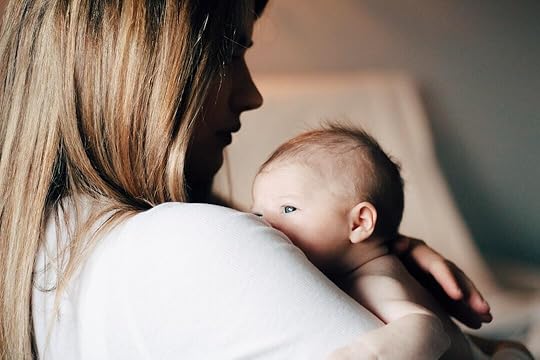 Photo by Hollie Santos on Unsplash
Photo by Hollie Santos on UnsplashWhat is postpartum psychosis?
Postpartum psychosis, or PP, is a severe but treatable maternal mental illness that should always be treated as an emergency. If you don’t know anyone who's experienced it, you might have come across it in TV shows, films or books. The most famous TV storyline is probably Stacey Slater’s in EastEnders. We’ve also seen characters in Hollyoaks and Casualty experience PP (both programmes I worked on, alongside the wider APP team, to support programme makers with accurate representations).
All of these programmes did a fantastic job of portraying the symptoms and behaviours associated with PP, which are:
Rapid/extreme mood swings (e.g. euphoria/mania)
An inability to sleep / feeling like you don’t need to sleep
Delusions (e.g. strong beliefs that other do not share, for example, paranoia that you are being followed)
Hallucinations (seeing or hearing things that others can’t)
Confusion
Irritability
These symptoms can come on rapidly in the hours, days, weeks or, occasionally, months after giving birth (and sometimes after baby loss, too).
To put it simply, as APP does in its straight talking campaign, if a new mum seems strange - if her behaviour or beliefs seem kind of bizarre - it could be a sign that she is struggling with PP.
It’s also important to note that, while women who have been diagnosed with bipolar disorder or experienced mental illness with psychotic features in the past are more vulnerable to PP, it can also occur completely out of the blue, in women with no prior experience of mental illness (in fact, around half of cases present in this way).
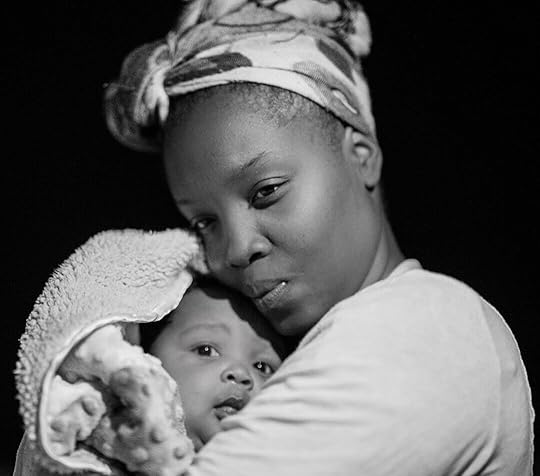 Photo by Andrae Ricketts on Unsplash
Photo by Andrae Ricketts on UnsplashWhat to do if you suspect PP
PP should always be treated as a medical emergency, and the best course of care is access to a Mother and Baby Unit - where new mums are treated with specialist care and support without being separated from their baby.
GPs and health visitors are usually a first port of call, but the APP website can also serve as an invaluable resource - as can the APP peer support community. All of this information and support is provided completely free of charge.
Speaking out and asking for help is key
Many women I’ve spoken to, if indeed they were able to identify that they were becoming unwell, said they were too scared to tell health professionals, friends or family about their PP symptoms because they thought they would be deemed crazy, perhaps locked up and have their child taken away from them. However, this couldn’t be further from the truth - as most women with PP go on to make a full recovery when they receive the right treatment. But getting that treatment - and getting it fast - is key.
Indeed, many women told me that being open and honest about what was going on inside their mind was a real turning point for them - because it was only then that they were able to access the correct treatment and medication.
What can you do as a member of the public?
We will all know someone - be it a friend, loved one, colleague or neighbour - who is at some point expecting a baby. And just being aware that PP exists, knowing the basic signs and symptoms and being able to reassure the woman or family affected that help is out there and recovery is possible could make a huge difference.
So many families have been in the midst of a PP episode without ever having heard of it - and that is far more frightening than being able to put a name to what’s happening and knowing that it can be treated.
Whenever I interview any woman or family member who has experienced PP I always ask what they would say to anyone else going through what they did and, overwhelmingly, the response is always along the lines of - ask for help. You can get better. It doesn’t make you a bad mum. And there is hope.
For more information about APP and postpartum psychosis (including many stories of recovery) visit www.app-network.org
If you’ve experienced PP in the past, it doesn’t matter how long ago, the peer support community is always open to you. For more information, click here.
If you think you, or someone you know, is experiencing PP, get urgent help now. Read APP’s guide on where to turn.
Thanks for reading Larking with Words Subscribe for free to receive new posts and support my work.
April 24, 2025
We bemoan the fact that Katie Price can't leave her face alone - but neither can we
I’m all for a well-crafted headline. Something that grabs your attention and compels you to read on. What I can’t stand, however, is clickbait that lures you in by suggesting the very opposite of what the publisher knows the majority will think when they’ve read the article. The aim? Clicks (naturally) - and a torrent of comments that will no doubt be abusive and almost tribal in nature and which, I can only imagine, are not considered the responsibility of the media outlet because they didn’t write them.
Do I click on them? Look - I’m no angel. I have a very unhealthy and unwanted appetite for diving into comments sections to see just how painful it is. But I think that’s the point. The posters know there are those of us who simply can’t keep away - whether that be to attack or defend, depending on the topic. And the ensuing chaos is like something out of The Last of Us - which I guess makes the parts of the media that do this like…a fungus. A fungus that can control how we behave - and predicts it with accuracy.
Thanks for reading Larking with Words. Subscribe for free to receive new posts and support my work.
You have to wonder how these posts are created. Are there people sitting around a virtual table in a virtual room saying, OK, how will we get our clicks today? And someone else says: I’ve just been sent a terribly unflattering picture of Katie Price - let’s put that out there with a headline of how great she looks and everyone will disagree and rip her to shreds. Brilliant.
That’s exactly what I’ve just seen. And it’s absolutely horrific.
The headline (from the Daily Mail) reads: “Katie Price looks better than ever as she takes her new puppy for a walk.” It was posted 20 hours ago and has already amassed more than 5k comments. I’m not going to share a screen grab or link, because it’s just cruel. And one thing that, sadly, doesn’t surprise me, is the fact that there are many men and women tearing her appearance apart. Us women who, when we see another woman we know, fuss over how wonderful she looks - and how gorgeous her new hair colour is - even if we don’t truly believe that said colour really does suit her because, at the end of the day, we don’t want to upset her. And taste is subjective. Mine is certainly not shared with everyone. I’m a marmite girl.
And yet, sitting behind a keyboard, we can ferociously, compulsively and relentlessly tear actual real human beings apart for their looks in a kind of mob state of hateful bullying. I mean, that’s what it is, surely? It’s vicious bullying.
Katie Price’s face - and body - has been the subject of much debate. She’s a controversial public figure and her looks have, obviously, played a huge part in her career. So it’s fair game, right?
 Photo by Jonathan Borba on Unsplash
Photo by Jonathan Borba on UnsplashWe criticise her for all the plastic surgery she’s had - yet we continually shame and criticise her looks, too.
It’s the same with other female celebrities. Madonna, for example, who often elicits comments such as OMG she’s too old to keep doing that alongside OMG why does she keep having plastic surgery? Yeah, I mean, we should all wear cardies and hide away in a remote part of the world pretending we don’t exist and we’ve nothing to offer society when we hit 60 - right?
Undeniably beautiful, Pamela Anderson is apparently ‘ageing like milk’ just because she refuses to wear make up, while Aimee Lou Wood ‘deserves’ to be made fun of because she ‘chose not to fix her natural smile. It’s her choice.’
But it’s not their choice to be bullied and ridiculed. It’s the media’s choice.
The media chooses what to put out there in the name of ‘news’ to garner clicks, engagement and money. And we respond like zombies ripping the flesh from the unfortunate subject and devouring them piece by piece until we spit out someone who is so broken they feel they have to change their looks - and then we rip them to shreds for that, too.
Damned if you do…
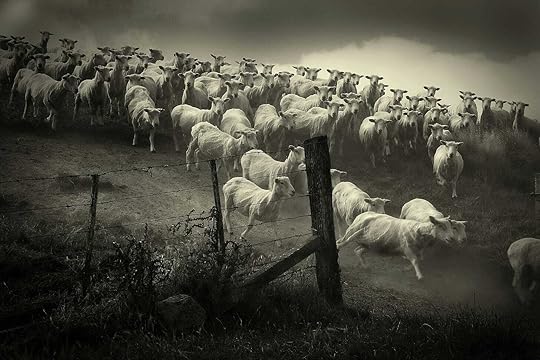 Photo by Nareeta Martin on Unsplash
Photo by Nareeta Martin on UnsplashBut we do have a choice not to respond in the way the media predicts we will.
I don’t really know how I feel about Katie Price - I’ve never met her and I admit I have sometimes had instant and emotive negative reactions to some of the headlines about her. We can’t help ourselves when they’re served up to us (even though we never ordered them - thanks algorithm, I’m not sure why you think I want to read the Mail’s headlines? Is it because, IDK, perhaps you want to stoke the FIGHT in your comments by reaching the very people who won’t like what you’re saying?).
But we don’t have to hit the keyboard and join in with the growing zombie fungus that exists to strangle any hint of humanity, surely?
We can choose not to be a part of it.
I’m no saint. I’ve been guilty of harsh comments. And I’ve received harsh comments about my appearance on social media before, too. But I just think we should take a moment to think about what we’re adding to the conversation and who benefits before we post. Because it’s not the celebrity in the headline who benefits - and it’s certainly not us.
We’re simply generating more money for the media, and reinforcing the toxic and unrealistic societal expectations that we - and our sons and daughters - have to exist within.
Thanks for reading Larking with Words. Subscribe for free to receive new posts and support my work.
January 10, 2025
When Sally Killed Harry
Late, as ever, to getting the word out on all the many gazillion platforms we authors need to keep on top of these days but I’m here now to say, hi, meet Sally - the protagonist of my new revenge thriller When Sally Killed Harry.
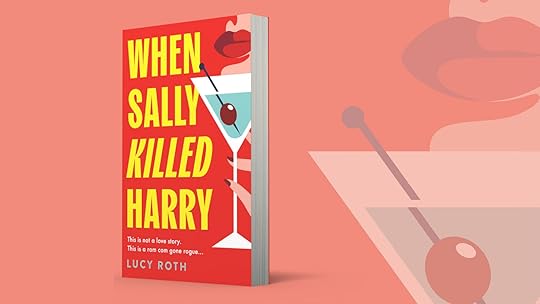
So who is Sally?
Thanks for reading Larking with Words. Subscribe for free to receive new posts and support my work.
Early readers who have enjoyed the book describe Sally as ‘snarky’, ‘sardonic’, ‘hilariously witty’, ‘sharp’ and ‘unhinged’.
One even described her as a bit like Jason Dean, Christian Slater’s character from Heathers - I kind of like that!
Anyway, Sally has left London for a new life in New York after trying for years to come to terms with a traumatic childhood. She meets the enigmatic Harry and finally wonders if she can trust again, but he’s no Billy Crystal to her Meg Ryan.
More…Tommy Lee Royce meets Villanelle…
“This was a darkly funny and unhinged wish fulfilment tale about women pushed to the edge to get justice in a patriarchal society.”
Reader review
It’s fun and pacey, but be warned, it’s dark too. I couldn’t write a fantastical serial killer thriller about getting revenge on bad men without exploring the abuse women face. It doesn’t go into too much detail in this respect though, it’s more about the impact these experiences might have, about the women’s lives not the act itself - and also about them finding liberation in many different ways (even some law-abiding ones like friendship and life drawing class - but yep, mostly murder).
So yes, there is darkness, and there is violence….and with that, there are also early readers who haven’t enjoyed the book. But some of the things they didn’t like would no doubt encourage someone like me to pick up a book so I’ll share what they said too….
“Far too dark.”
“Crass.”
“Nothing like the movie.”
“Not a single good man in it.”
Yeahhhhh….there isn’t a single good man in it. I realised that as I submitted my first draft but then I thought, well, it’s not my job to lift the good men. There are plenty of good men in books and movies - love interests, heroes, etc. But there are unfortunately bad men too - and this book is about the women who take these bad men on. And I only had so many pages to fill so….I’m cool with my choices :-)
When Sally Killed Harry isn’t about hating men; it’s about shining a light on the stories that have been swept under the rug for far too long. It's about amplifying the voices that have been silenced and empowering women to claim their space, their stories, and their anger.
Reader review.
Anyway, it’s now available to request on NetGalley for early readers to review, and, BIG IMPORTANT ANNOUNCEMENT it’s also available to pre-order - and pre-ordering really does make the author world go round so if you fancy a read of it pop a pre order in at any of the usual places (the button below will take you to the publisher page which will direct you to wherever you want to be to order).
When Sally Killed Harry is published March 27th by Avon - an imprint of HarperCollins. Here’s the trailer if you’d like a taster!
Hope you enjoy meeting Sally as much as I enjoyed writing her!
Lucy xx
(aka Lucy Nichol / Lucy Roth!)
Thanks for reading Larking with Words Subscribe for free to receive new posts and support my work.
November 8, 2024
Are women not believed - or are our experiences just not that important?
That’s a question not only directed at men, by the way.
I remember when I was having trouble with some senior male execs at work (yes, I’m mentioning it *again* because it drove me to the brink of insanity and also - it is my story), I was advised by another woman to ‘keep my head down’. That advice could have potentially saved me from further bullying, but it would have turned me into a nodding dog who had no influence in her own career - let alone see me wave goodbye to my values. Would many men be happy with that kind of outlook?
Thanks for reading Larking with Words Subscribe for free to receive new posts and support my work.
Since speaking out and filing a complaint relating to the relentless gaslighting and bullying I endured at a time when my mental health was already rock bottom (maybe it was because my mental health was rock bottom that it happened?) I have been ignored by some former colleagues, made to feel like I was a trouble maker, felt like I was hiding a terrible secret when applying for new jobs and publicly insulted by a particularly nauseating former male colleague on LinkedIn for taking money when I was clearly inadequate at my job (I never told him anything about why I left and he has no experience in my field of work so clearly, one of bullies I complained about has broken their side of the NDA we signed). It’s exhausting.
But this story is not unique. In fact, these experiences are endemic.
When it comes to bullying in the workplace by men (tick), when it comes to sexual harassment in the workplace (tick - I was a 17 year old on work experience) and when it comes to sexual assault (tick - I was grabbed in the street on millennium night by a guy who insisted I give him a NY kiss) I have experience.
However, many women and girls have suffered much, much worse than I have, and I, like everyone else I know, has either experienced, witnessed or heard these stories first-hand from people we know, love and respect. And we’ve seen what these actions can do to people.
The outcomes, however, are usually weighted in favour of the bullies or attackers.
I never reported the guy in the street because I was drunk, high and walking alone. I’d surely be blamed and called stupid and irresponsible. ‘Asking for it’ is the phrase that springs to mind. Does that give him the right to rip my favourite top?
When I reported the guy in his 30s who told me he’d take me out and not to tell anyone when I was a 17 year old kid on work experience, I just got moved departments.
When I made a complaint about the men bullying me, I had to leave my job (that’s what happens when you complain about the men at the very top) and signed an NDA. Sure, I received some financial compensation from the company for having to leave my job (most of it went on mental healthcare and the gap between employment) and I got away from the bullies. But what happened to the bullies?
Nothing.
They remained in post. The company protected them and paid for their actions. They probably never thought about it again after blocking me on Twitter (I sometimes wondered if my follower count and numerous national media bylines could be a factor in me apparently upsetting my narcissistic boss. I mean, with men like that, they can be very easily upset).
Meanwhile, as they carried on, business as usual, my GP upped my medication and introduced beta blockers because of the state I was in. I was having to find excuses regarding the gap in my CV and, if you can’t already tell, yes, I am still seething with anger at the injustice of it.
And I am not alone. If you look at the Speak Out Revolution dashboard on their website you’ll find many, many stories of workplace bullying, sexual harassment and NDAs.
But this theme of not being believed, of being made to feel that you’re a trouble causer who’s out to get £££s isn’t confined to workplace issues.
When sexual assault and rape are reported women are often disbelieved. And when this involves a powerful man - especially a celebrity - women are often considered trouble makers or liars who are in it for the cash and the fame. And not just by men.
The protective shroud that bad men throw around each other in such instances is despicable and encourages repeat offending. Men carry out these actions, and, there are many women who, fearing the very real prospect of backlash, do simply ‘keep their heads down’. And due to the psychological impact that these acts of violence must surely have on them, I can’t blame them for staying quiet and suffering in silence.
But the worry is that, for those women who might be on the cusp of speaking out, they are seeing time and time again the media, keyboard warriors and, often, other women, calling them liars. So if we all stay silent, the abuse, harassment and bullying continues, and the men become more and more powerful, thus increasing the likelihood of these awful experiences and crimes happening to more women and girls.
If a man is powerful, he is in a better position to commit the offence in the first place. He might be narcissistic, believing he is entitled to treat women however he pleases. He might feel protected by power and money and therefore feel untouchable. But when a brave woman speaks out about men like this, sadly, these men do indeed pull all their power, their money and their horrible little mates together to go after her.
Look at Russell Brand. All those women must be lying because there’s another agenda at play - Russell brand’s political beliefs and investigations. So many people think that, just because they believe some of the same things that the accused does, because they can empathise with them on some level, the accusation couldn’t possibly be true.
I valued the addiction recovery work Brand used to do. But now we know more about his behaviour, thanks to the many, many women speaking out, it’s not something I want to shout about anymore. And I won’t.
There’s a line in a Tori Amos song about a break up - ‘I don’t believe you’re leaving cause me and Charles Manson like the same ice cream?’. Yeah, that would be ridiculous wouldn’t it.
But wouldn’t it also be ridiculous to think Manson’s not a bad guy just because he liked choc-chip ice cream and the Beatles?
The problem with some of these men who commit these awful crimes and bully people is that they often do have some redeeming features. It’s how they get away with it. They can often seem nice and fair to the people they are not abusing/bullying. They might vote for the same political party as you or like the same band or support the same charity. But so what? It doesn’t lessen the likelihood of them committing a crime or act against a woman and it doesn’t lessen the impact of that.
Bullies and rapists do not go around with a label stuck to their forehead.
We need to stop centring these men at the heart of women’s experiences. And other men, and women, need to be allies and stand with the women who make the accusations. Especially when they know those accusations to be fact. Why doesn’t this happen? Often, it’s because they’re scared of losing their jobs too.
Because this ongoing cycle of cover-ups and accusing women of lying and chasing money when they speak out about their experiences keeps violent, bad men in the positions at the very top.
And this week is perhaps the biggest more despicable example of that in modern history - as we welcome a convicted felon, racist and adjudicated rapist into the White House.
But that doesn’t matter does it, cos some guys in Pennsylvania want to stop foreigners moving in next door. So who cares, right?
I’m so tired of this shit.
Thanks for reading Larking with Words | Subscribe for free to receive new posts and support my work.
July 14, 2024
5 secrets shared by romcom authors
I’ve just got back from a weekend in Manchester having attended / spoken at one of the loveliest writing festivals - Love Stories, etc - a celebration of romcom featuring 28 romance writers.
Organised by the brilliant Alice Murphy-Pyle of HarperNorth and Sara-Jade Virtue of Simon and Schuster I was honoured to join one of the themed panels (our was about writing ‘funny stories’) to share some of our cringey experiences (mine involved a portaloo and wet jeans. Grim), favourite comedy books/shows that we keep returning to (Breaking Bad for me - that hook is pure genius) and inspirations for writing funny.
Thanks for reading Larking with Words. Subscribe for free to receive new posts and support my work.
But outside of my own panel (which was chaired by Lauren Bravo and featured writers Melanie Cantor and Jamie Fewery) we had panels themed around beach reads, what is love, hope and many more.
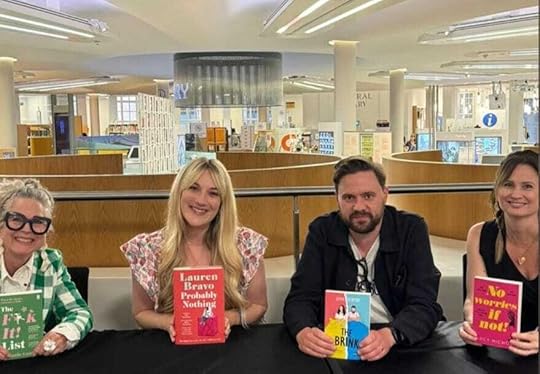 The ‘Funny Story’ panel L-R Melanie Cantor, Lauren Bravo, Jamie Fewery and me
The ‘Funny Story’ panel L-R Melanie Cantor, Lauren Bravo, Jamie Fewery and meSo I thought I’d share some of the talking points, tips and tricks discussed during the day. AND APOLOGIES IN ADVANCE if I can’t recall who to attribute what to - I took no notes because I’m a doylem! Please add in the comments if you were there and remember who said what! (And if I got any of them wrong!)
Most authors experience a crisis of confidence when writing their current book - no matter how many times they’ve written beforeThis was incredibly reassuring to hear, because I feel this Every. Single. Time. Can I really do it? Were all the other times I produced a complete manuscript simply flukes that are never to be repeated again? What if I’ve ran out of steam and should instead be chucking it all in and applying for a job on Tesco bakery (that was a gem from the hugely successful author Lucy Diamond - and she’s written about 20 - including some Sunday Times bestsellers). It’s clearly a universal issue. Oh, and another thing…
Most authors dread the 50k mark…I thought it was just me but apparently the ‘dreaded 50k mark’ is A THING. A point where you’re ready to scream while chucking your laptop out the window. The point where your mind is either blank or blocked with too much STUFF. It feels hopeless - but lots of authors go through it - and their books are all about twice that long in the end so…
We don’t need to write likeable charactersDuring one of the morning sessions, one audience member asked how the panel made their characters likeable. If memory serves me correctly, it was the panel chaired by Lucy Vine…anyway, I was SO reassured by her (was it Lucy’s?) response which was along the lines of ‘but why do my characters need to be likeable?’. I’ve heard a few people say this recently and it really helps because, to be frank, my characters can be rather abrasive, prickly and difficult beings. In my mind, I think I don’t need readers to necessarily like my characters, but to understand them. And perhaps find their journey entertaining / thought-provoking. After all, everyone loved Succession and I’m not sure there was a single likeable character in that series (aside from the Disgusting Brothers, of course).
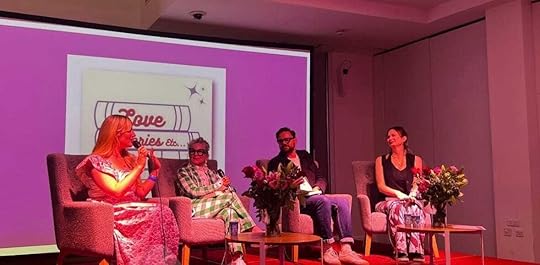 Specificity is key to funny…
Specificity is key to funny…This one was a gem of a tip from Lauren Bravo - who I am sure credited it to another author or comedian, but I can’t for the life of me remember who (Victoria Wood, maybe?). As Lauren put it (in words vaguely similar to this but you’ll get the gist), rather than saying, I was eating a ready meal, say I was eating one of those about-to-turn ready meals from the whoopsie aisle in Asda…Adding specifics somehow makes it more entertaining.
Joyous books about LGBTQ relationships do exist…This was discussed by a few authors, including Kate Young on an earlier panel and Philip J Ellis later in the day. I was honoured to host Kate’s recent event in Whitley Bay at The Bound and she also talked then about how important it was to have a story about LGBTQ relationships that was joyous having grown up with so many darker tales focused on the struggles and discrimination faced by the community. Yes - those stories are important. But so are brilliantly joyous LGBTQ romcoms. We need more of them in the world, but there are a few already making their mark (a couple to mention are Experienced by Kate Young and We Could Be Heroes by P J Ellis).
There’s lots of imposter syndrome around saying the words ‘I am a writer’This is a long-held observation of mine - as someone who has written and published several books, I still sometimes feel slightly cringey about saying I’m a writer - as if someone’s going to ask ‘Oh do you write full time?’ or ‘Is your book available in Tesco?’ (The answer to both of those questions is no, in case you’re interested). Anyway, the thing is, yes, sometimes I might get asked those things. Indeed, my husband is an actor and he can’t remember the number of times a taxi driver has asked him if he’s been in EastEnders. It doesn’t make him any less of an actor, and it doesn’t make you any less of a writer. So this is a reminder to myself, and every writer I met he described themselves as ‘an aspiring writer’ - the only prerequisite to saying you’re a writer is, well, writing. You’re not saying you’re a Sunday Times Bestseller or even saying you’re a published author. But if you write…then you are a writer.
Anyway, there’s a few little nuggets from the day. But thanks to everyone who made the festival what it was - because it was MINT. But I guess if a bunch of romcom authors / readers / publishers can’t create warm and fuzzy vibes when they’re all in a room together then, seriously, who can?
Here’s a little montage of all the authors, workshop leaders and speakers….
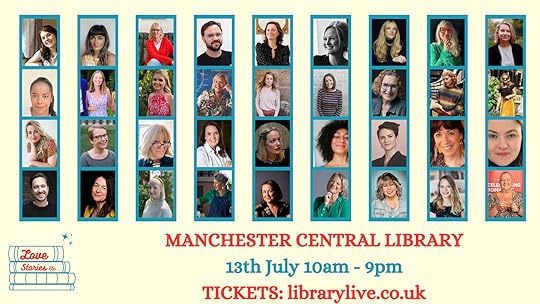
Thanks for reading Larking with Words! Subscribe for free to receive new posts and support my work.
May 26, 2024
Finding your teenage tribe
I was 14 years old and on holiday with the family, listening to my cassette tapes through my crappy walkman and feeling as though I had to make a choice. Was I going to finally ditch those rave tunes in favour of Nirvana, Sonic Youth, Hole…
I was listening to both. Each side of the cassette tape had ridiculously opposing music. Ratpack were searching for their rizla on one side, and Courtney was looking to get loaded on the other (well….I guess you could say they had *some* things in common).
Thanks for reading Larking with Words! Subscribe for free to receive new posts and support my work.
I chose Nirvana and co. Although I decided that a peppering of the Prodigy was still respectable and welcome.
But I got more than simply acceptance from my new friends and great music that I’d still be listening to 30-odd years later. I started wearing a new ‘badge’. I was part of a tribe. And that meant that, no matter how bad my teeth, my skin, my lacklustre teenage hair, I would be able to show the world something else about me before all the bits that made me so excruciatingly self conscious.
I’ve been working with Bethlem Gallery recently promoting its Live Lounge exhibition (if you’re in London do check it out - it’s lots of fun and FREE!). As part of this, Professor Sally Marlow of King’s College London has been talking to me about why the music of our youth is so important to us. She talked about how it serves as a ‘badge’ and how it plays a huge part in our friendship groups and connections. But I think the ‘badge’ concept is really interesting for many reasons.
I was very shy and awkward and I had TERRIBLE teeth (train track braces were an absolute MUST for me) so I wasn’t particularly outgoing. And you might think that if you’re not all that confident you would probably dress down so as not to be noticed.
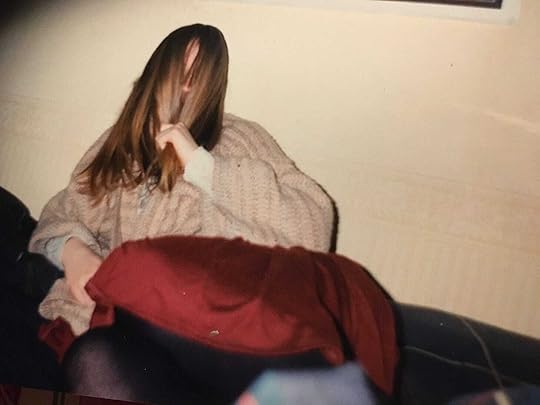 Me as a teenager, camera shy but dressed in my best second hand cardies
Me as a teenager, camera shy but dressed in my best second hand cardiesBut the thing is, when you find your tribe and a way to express yourself as part of that tribe, you are showing the world your music taste and community before you show them your teeth (sadly, there aren’t any pictures of me in my more interesting teenage threads - no camera phones - so it’s just teenage me in woolly cardies and jumpers on this page sadly).
You see, I felt far more comfortable dressing a little bit differently to all my school mates because I thought it would hide my teeth, my bad hair and my actual shyness. I thought this imperfect way of dressing would soften the bits of me I didn’t like - and pronounce the (very few) bits of me I did - my interests, my teenage love of art and new taste in music. And I thought it might make me more interesting. I mean, I was convinced there had to be *something* interesting about me - but the shyness stopped whatever it might have been from coming out.
Courtney Love and Kat Bjelland fascinated me. And yet they were not exhibiting the standard, wholesome ‘pretty girl’ look that was all over our TV screens at the time (90210, Baywatch, etc). But they looked great.
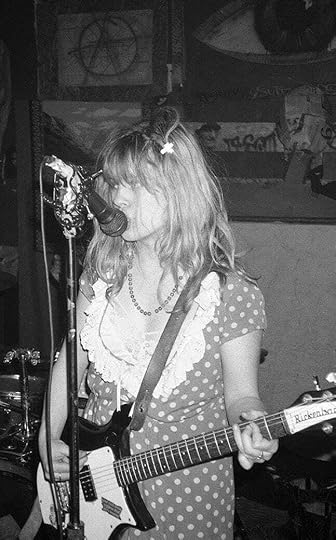 Kat Bjelland of Babes in Toyland
Kat Bjelland of Babes in ToylandSo buying second hand dresses in off white with lace and blue ribbon, white fish net tights, blue velvet flares and pink 70s shirts was part of my new passion. Part of my new ‘me’. And while I remained shy for a couple more years, I started to gradually come out of my shell a little.
I’m never going to be standing on stage and authentically screaming into the mic about being a teenage whore or whatever. And back then, if you imagine a young girl living in a village called ‘Cherry Burton’ who had to hide her cigarettes from her parents for fear of getting grounded you’d see that there was no way I was even remotely ‘punk’. But finding that music and that ‘tribe’ was hugely significant to me. The girlfriends I made back then are still my closest friends, I still listen to the same music (albeit with newer stuff added to the mix) and I am LOVING the 90s re-vamp that Urban Outfitters continue to push (you’re never too old to wear it again in my view).
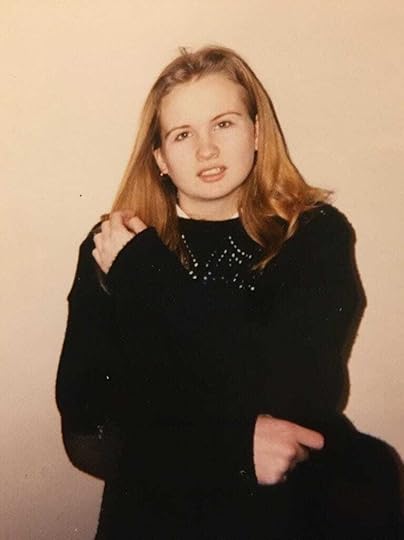 Me at school, covering up the uniform with a black woolly jumper. And yes, I know I have terrible eyebrows. Didn’t we all.
Me at school, covering up the uniform with a black woolly jumper. And yes, I know I have terrible eyebrows. Didn’t we all.I think it feels kind of contradictory on a surface level when you think about shy people dressing in a way that makes them stand out. But when you think a bit more about it, it actually makes a lot of sense.
Here’s an extract from my 90s novel The Twenty Seven Club about Janis Joplin on the same subject (NB - this is written from the point of view of a fictional fan - NOT a music expert!):
Extract - The Twenty Seven Club
I think I always loved Janis as a kid because of how colourful and theatrical she looked. I had similar feelings about Adam Ant and Boy George as a teenager – but Janis was something else. The feather boas in her hair, the beads and flared trousers. I remember being sent to Brownies dressed as Janis and Brown Owl wasn’t overly impressed – I couldn’t understand why.
I remember reading that Janis was voted ‘ugliest man on campus’ in college. Have you seen her? Have you heard her? There’s simply nothing ugly about Janis. I kind of related to it though, because I was always given grief in school after Mum left. Dad wasn’t especially good at doing my hair – although he did try at first – but eventually he just started asking the hairdressers to cut it short. And I didn’t miss the pain of him getting lumps of my hair wrapped around his fat fingers and my little hair bobbles. Ouch.
However, it wasn’t just my hair being cut short. My wardrobe wasn’t regularly updated, so half-mast trousers were standard issue. I was told I looked like a boy on a daily basis.
I think that’s probably where my Dr Martens, knackered old dress and cardies look came from when I think back. I never felt particularly comfortable in a pretty dress and ribbons. Not that I wanted to blend in. Far from it. I can feel far more relaxed in something a little outlandish because then it’s not really me, is it, that they’re staring at. It’s just a look. You can hide behind a look. Did we see the pain in Janis’ eyes, or did we see the feather boas?
And besides, surely anyone would feel far more comfortable being criticised for being a bit out there rather than being criticised for being dull or quiet? We often confuse being ‘out there’ with confidence and happiness, when in many cases, it’s the exact opposite.
If you fancy grabbing a copy of The Twenty Seven Club - a darkly comic novel exploring music myths and mental health - or indeed its follow up, Parklife, about addiction, friendship and recovery, click here.
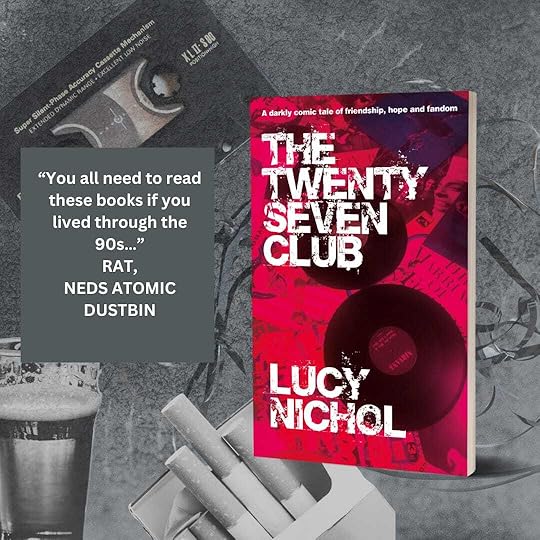
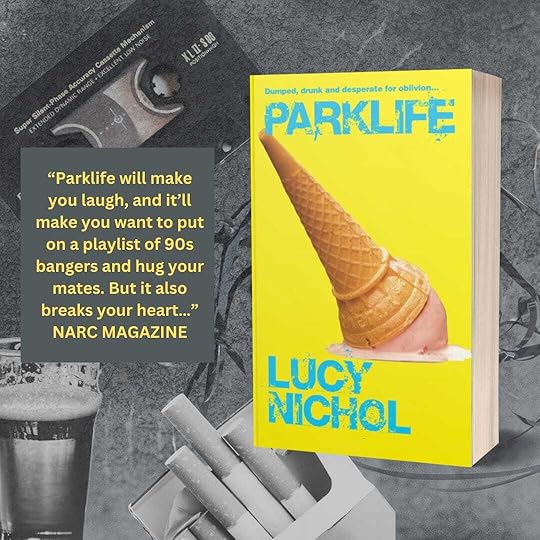
Thanks for reading Larking with Words! Subscribe for free to receive new posts and support my work.
March 5, 2024
How I became a published author
Last week I gave three talks about being an author and the questions that kept coming up were primarily focused around how to go from writing something to actually getting it published and out into the world.
So, here are a few of the points I covered last week during my events at Ingleby Barwick Library, Newcastle University and Newcastle City Library (and BIG thanks to everyone who welcomed me!). Hope these are helpful.
Thanks for reading Larking with Words | Subscribe for free to receive new posts and support my work.
What do agents do?
First of all you might wonder why you even need an agent in the first place. Some people believe that they simply get you a deal and take a cut of your earnings. But this isn’t the case. While I have only worked with one agent, and therefore I can’t comment on the industry as a whole, in my experience, my agent has supported me with so much more. For example she helps me with coming up with story ideas and hooks, commenting on which will do better, and she has provided editorial feedback, supported me in understanding what my author brand is and also helped me to explore what genre I should be writing in - as well as pitching me to publishers. In addition to that, she is also a bit of a coach/counsellor on the other end of the phone - although I think that’s a bit of an added extra!!
To put it simply, an agent is your cheerleader. They help you get your foot in the door with publishers because, as you might know, it isn’t exactly a doddle getting an agent (I’ll come onto that next), so it gives you some kudos already that somebody is willing to represent you and pitch your books out on your behalf.
Agents will also help to negotiate your publishing contract - which can be a completely baffling experience if you don’t know what you’re looking for.
So are agents worth it? Absolutely YES - in every sense.
 Photo by Kimberly Farmer on Unsplash
Photo by Kimberly Farmer on UnsplashHow do you get an agent?
Once you’re happy with your manuscript you can start pitching it out to agents or, as some people call it, querying agents. It’s important to make sure you are happy with what you’re submitting by ensuring you do a thorough proofread, perhaps even sharing it with a beta reader or two in advance.
You then need to search for agents who represent the kind of work you want to get published. There’s no point sending a sci-fi manuscript to agents who prefer romantic comedy, for example (unless you’re crossing the genres of course!).
Google literary agencies and then take a look at their agent bios. You can usually see what appeals to them in the bio, and then get an idea of who they work with too (they usually have their represented authors featured on their page too).
When you do pitch to them, make sure you tailor your email/query letter. Don’t just blanket send the same thing out - you need to identify why you think you’re a match for them based on their interests and the other authors they represent.
Also, be sure to follow their submission guidelines. They might have an online form to complete, or they might request an email with the first 10,000 words of your manuscript and a synopsis. Always follow these requests.
What if I get rejected?
All writers have experience of rejection. You may well be rejected 30 times before securing your agent. But it’s worth remembering it only takes one agent to love you and your work. Plus, even some of the big names in literature have received many, many rejections in the past so don’t let it put you off.
Any personalised rejections you get are invaluable - this is feedback from an industry pro and well worth taking on board (although it’s also worth remembering that sometimes it’s just down to preference and whether an agent really connected with your work). Either way, it’s a positive thing. If you do happen to be ghosted by an agent, sadly, it’s just the way it goes sometimes - as you can imagine, on top of the hundreds of submissions they receive, they also have a roster of authors to look after, so life as an agent is incredibly busy.
Can I pitch directly to a publisher?
Yes you can, but not all publishers accept what they call ‘unsolicited manuscripts’. So again, have a look at their submissions page and follow their guidelines. Some might be open to direct submissions all year long, others might have submission ‘windows’ and some might only take submissions from agents.
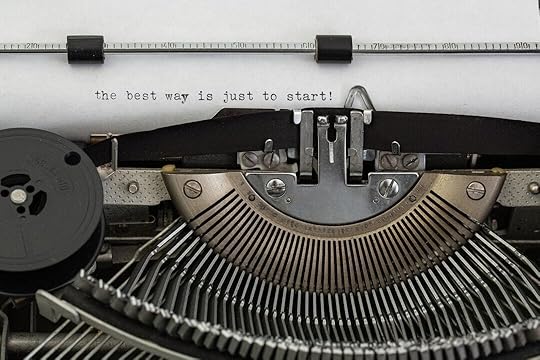 Photo by Wilhelm Gunkel on Unsplash
Photo by Wilhelm Gunkel on UnsplashWhat about self-publishing?
There’s still a little bit of stigma around self-publishing but as someone who has done it themselves, as well as being traditionally published, I can see pros and cons on both sides. Basically, a publisher needs to make their investment back, so your book needs to be commercially viable for them. I’ve had three books traditionally published and I self published two. These self-published books, The Twenty Seven Club and Parklife, were not considered commercial enough as they were a little darker in tone and, I think the biggest issue was the fact that they had a heavy music focus. Some publishers felt they didn’t know enough about music to edit them, some thought they were a bit niche/alternative or too punk! But it’s worth noting that this doesn’t mean you won’t have any success if you publish them yourself. I have sold circa 6k copies of my self published books since 2021, so I think they’re doing OK! It might not make me a bestseller but it all builds up. Plus, you get much more creative control over everything because you are your own publisher. Just be sure to work with a good editor/proofreader and to get a really good cover designer.
I hope some of these points are useful. Please add any further questions in the comments section below and I’ll do my best to reply to them.
Lucy x
Thanks for reading Larking with Words! Subscribe for free to receive new posts and support my work.



